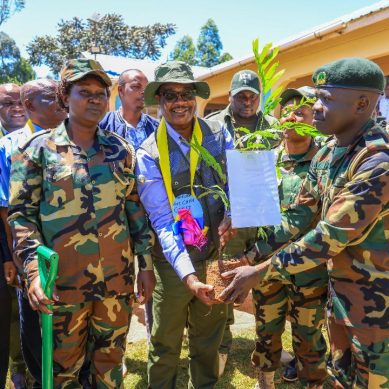Behind every problem in Uganda there’s Museveni, which is how education system was designed to reject children in lower school
If the leadership in place lacks knowledge, wisdom, understanding and insight but continually pretends to have them and gives the impression that no other alternative system can address those problems, then it cannot extricate itself from the problems. You cannot be part of the problems and then cast yourself as the one with the solutions. It is deception.
Why false and empty promises are likely remain the currency that drives Uganda’s politics and governance
False promises in governance are an aspect of bad governance since we cannot build meaningful and effective leadership, governance, equity, equality and justice, nor sustain patriotism in the country in the long term. Patriotic people are not made through a chain of false or empty promises, especially when some sections of the population actually get promises fulfilled discriminatively at the expense of others.
One day we’ll wake up at the end of looting spree in Kenya to find its potential is all behind us and it is a land of lost opportunity
When President William Ruto is not roaming the countryside in the name of “bring development,” he is globe-trotting under the guise of shopping for employment the jobless youth. It is a shameless admission that his bottom-up policies cannot power the economy to generate jobs for more than three million graduates who are desperate to deploy their skills to nation-building. How can a government train manpower, then give it away for other countries to use?
Insurgency in eastern Congo echoes dangers of constitutionally manufacturing ‘indigenous’ Banyarwanda tribe in Uganda in wider Museveni-Kagame plot to create Chwezi superstrate
Whether they are in Uganda, Rwanda, DRC or Burundi, they take themselves as one and the same with the same interest: survival as a small group in a sea of indigenous Bantu and Nilotic groups. To survive in modern times they must capture every civic space, conquer the natives, exclude them from resources, divide them, make laws that create fear in them and prevent them from organising themselves politically and effectively. They control the electoral process in their favour, subordinate the civil to the military and rule them with an iron hand.
Why the revolutionary germ in Kenya’s Gen-Z tax protests is growing but political tribe has buried head in sand
You either die or accept to acquiesce in suffering to your grave. Gen-Zs elected the former and many of them were felled by what they perceived as the butchers gunshots. The stress were full of blood. The spirit, though, was not felled, just as was the case in the germinal revolutions in the far-away lands.
The powder keg in Museveni’s hands: There is reason to fear Uganda’s nuclear plant in Busoga is a tinderbox
One academic who retired from Makerere University service recently asked me, “Can Uganda with its incompetence manage a nuclear plant without the risk of nuclear leakage? Can Uganda that is not yet a fully stable nation state sustains a nuclear plant without the risk of some rebel group throwing a bomb in the plant and next time we here all Basoga are poisoned with nuclear pollution?
How clustering knowledge systems into monoliths called faculties fosters intellectual imperialism in Uganda, jargonises academia
In the context of Uganda, universities remain, as in the past, the main knowledge centres where knowledge is organised, authorised and governed. Here, our universities have continued to organise, authorise and govern knowledge within units or pockets of knowledge called disciplines within which the knowledge workers specialise in small bits of knowledge within each discipline.
Immoral consistency: Why calls by West to sideline Afghan cricket team reek of sports colonialism
What began as a boycott based on the International Cricket Council’s requirement that any nation with Test status must have an active women’s team has morphed into a catch-all protest against the numerous limitations placed on women and girls in the Islamic Emirate.
Kenya’s youth protests is a groundswell to rid the country of the whims of a despot and hollow benevolence of the West
The ability of the Kenyan state to maintain this level of violence against its populace has always been contingent on the acquiescence and support of the Western world, which in the years between independence and the US-USSR détente that led to the fall of the Berlin Wall, propped up Kenya as a bulwark against communism and valorised “stability” over justice.
Uganda: After ecocide and ethnocide, now President Museveni is churning out zombies and presiding over intellectual genocide
In Uganda ethnocide and ecocide are taking place simultaneously as the cultural heads sustained by the centre, are wallowing in goodies and monies provided to them by the very government presiding over ecocides and ethnocides in their cultural areas. Virtually all cultural heads, politically deprived, are swimming in their diminishing cultural base and ecologies.












